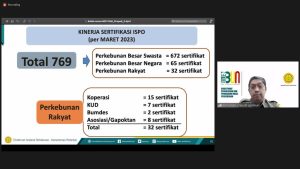
Oil palm is a mainstay plantation commodity that plays a major role in the development of the national economy. Plantation is a sub-sector that plays an important role in national economic growth. On April 3rd 2023, the Masters Program in Agricultural Economics, Gadjah Mada University, held a Capita Selecta Guest Lecture #3 with Dr. Prayudi Syamsuri, S.P., M.Sc., Director of Processing and Marketing of Plantation Products, Directorate General of Plantations, Ministry of Agriculture of the Republic of Indonesia. This guest lecture carries the theme of Challenges and Policies for Sustainable Plantation Development. The Capita Selecta Guest Lecture was moderated by Dr. Hani Perwitasari, S.P., M.Sc. (Lecturer of Capita Selecta Course).
Dr. Prayudi Syamsuri, S.P., M.Sc. specifically discusses the development of sustainable palm oil in Indonesia. Indonesia’s plantation export volume in 2022 is dominated by palm oil at 84%, followed by rubber, coconut, coffee, and cocoa. Indonesia controls 55% of the world’s share of palm oil production and comes from 26 provinces dominated by the Provinces of Riau, North Sumatra, West Kalimantan, and Central Kalimantan. The plantation area is controlled by private companies, community plantations, and PT Perkebunan Nusantara. As a labor-intensive industry, Indonesian people depend on the palm oil industry. The growth of the palm oil industry has contributed to increasing people’s welfare.
However, the development of oil palm in Indonesia still faces various challenges, such as low productivity, black campaigns, legality and permits, indications of forest areas, downstream, and various other problems. In addressing these various problems, the Indonesian government has issued various policies regarding sustainable palm oil, one of which is the Indonesian Sustainability Palm Oil or ISPO certification. The ISPO certificate is expected to be a guarantee for improved governance of oil palm plantations in Indonesia so that palm oil can be maintained as a source of long-term wealth.
